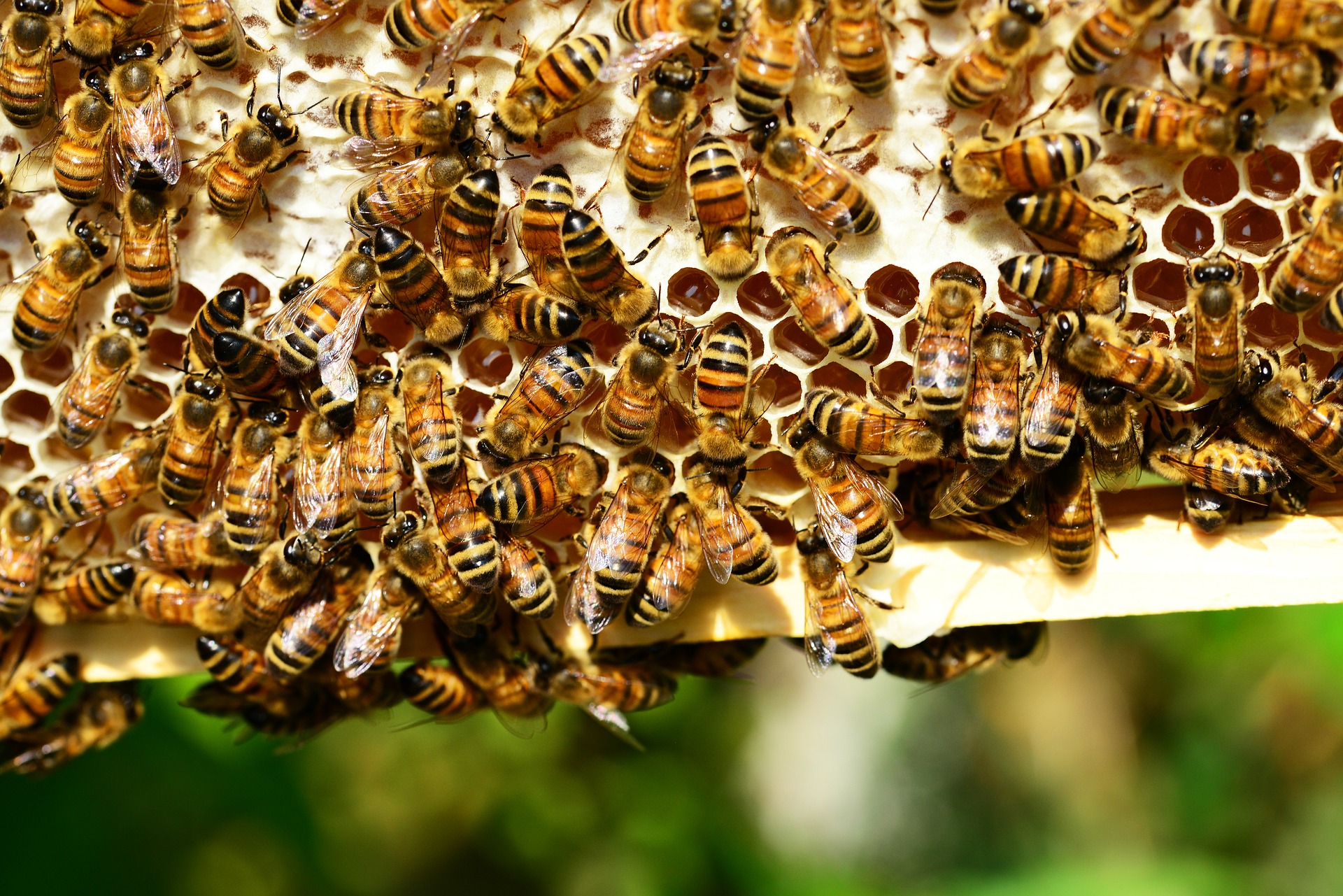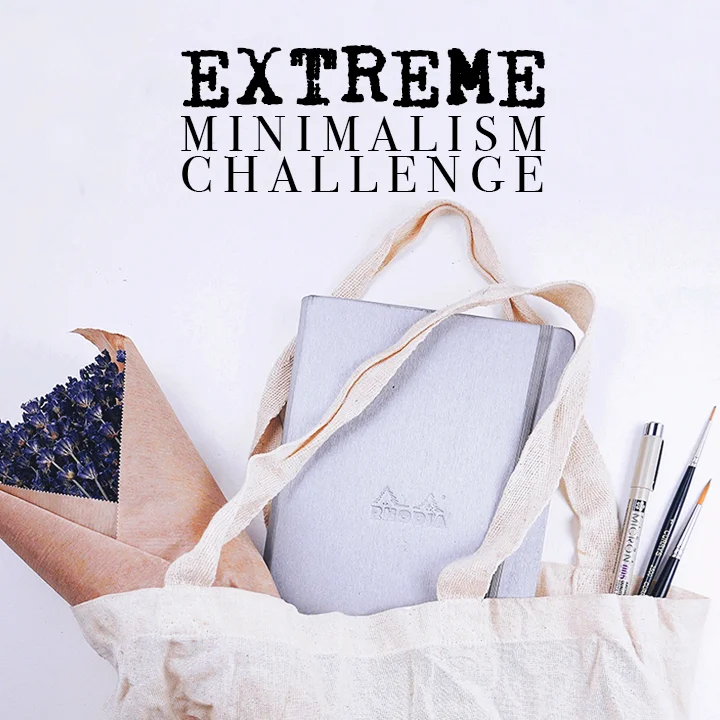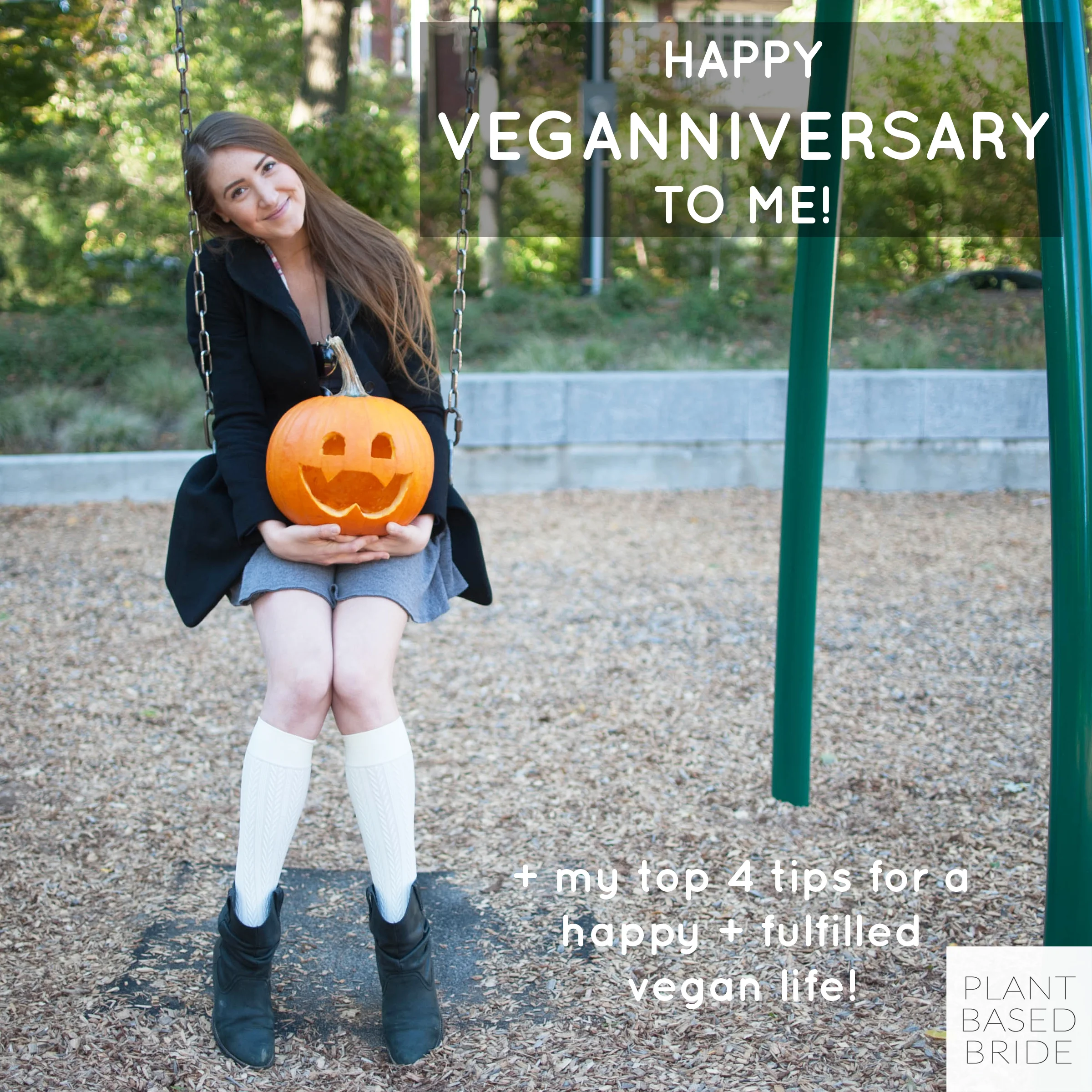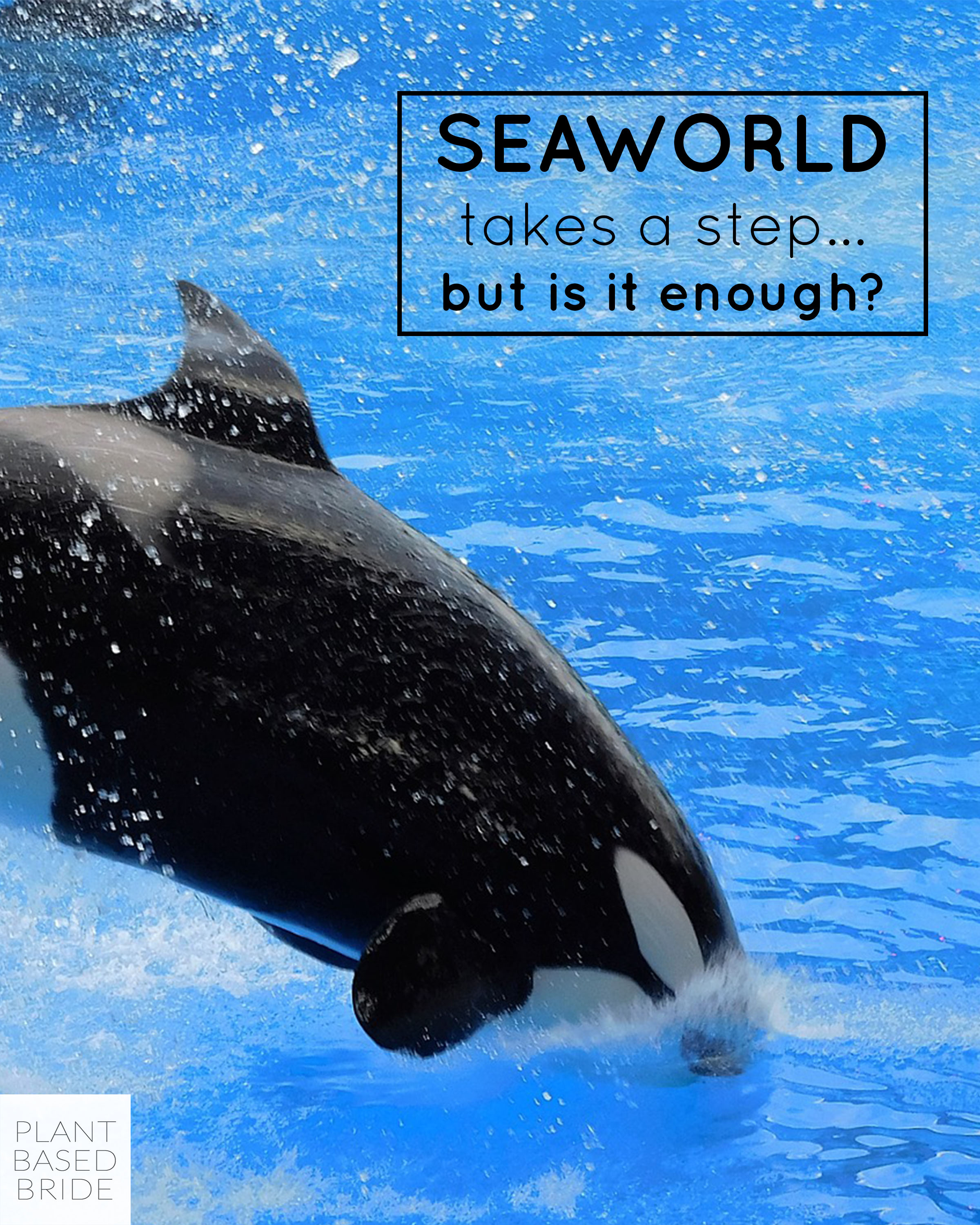
the blog.
Is Honey Vegan?
Is honey vegan? That's a question I hear a lot from the veg-curious. I understand the confusion. Bees aren't animals, right? And they don't get hurt by humans taking their honey, right? I mean, bears do it. Why can't we?
Well, there are quite a few reasons why I (and many) avoid honey. Not the least of which is the 'ick' factor... honey is actually pretty gross when you think about it.
But is it vegan or isn't it?
Is honey vegan? That's a question I hear a lot from the veg-curious. I understand the confusion. Bees aren't animals, right? And they don't get hurt by humans taking their honey, right? I mean, bears do it. Why can't we?
Well, there are quite a few reasons why I (and many) avoid honey. Not the least of which is the 'ick' factor... honey is actually pretty gross when you think about it.
But is it vegan or isn't it?
Let's start out with the definition of veganism.
VEGANISM is a way of living which seeks to exclude, as far as is possible and practicable, all forms of exploitation of, and cruelty to, animals for food, clothing or any other purpose. - The Vegan Society
As you can see, there are two factors which need to be considered when determining if something is vegan or not:
- Does it come from an animal?
- Is the animal exploited or subjected to cruelty to obtain it?
So, are bees animals? The standard definition of an animal is:
ANIMAL, a living organism that feeds on organic matter, typically having specialized sense organs and nervous system and able to respond rapidly to stimuli.
Under this, and many, if not all definitions, bees are very clearly animals. But are they subjected to cruelty or exploited in the process of making and taking their honey? Read on to learn eight reasons why no one should be eating honey, vegan or not:
ONE... Bees don't make honey for you.
Bees don't make honey for you, just like cows don't make milk for you and hens don't lay eggs for you.
You already know this, of course.
'The animals of the world exist for their own reasons. They were not made for humans any more than black people were made for white, or women created for men.' - Alice Walker
So why do we as a species continue to steal the fruits of their labour? Don't you think that perhaps, just perhaps, they make honey for a purpose completely separate from the uses we have made for it?
You might not know that bees work REALLY HARD to make honey.
- Each bee visits between 50 and 100 flowers to fill their crop (second stomach);
- To make 1 lb of honey the bees need to visit around 2 million flowers and fly over 55 thousand miles (that's more than the distance around the world. Times two!);
- Bees spend A LOT of time making honey. In fact, if bees made minimum wage, a jar of honey would cost $182,000.
- If you eat 2 tbsp of honey you are eating the entire life's work of over 36 bees.
Bees don't make honey for our benefit, and we have no right to it whatsoever.
TWO... Stealing is wrong.
No matter how you look at it, we all know that stealing is wrong.
For the religious among you, remember those pesky commandments? What was number 7 (or 8, depending on your religious affiliation) again? Oh yeah...
'Thou shalt not steal.'
Pretty straightforward, if you ask me.
What if you're not religious?
From the criminal code of Canada...
'322. (1) Every one commits theft who fraudulently and without colour of right takes, or fraudulently and without colour of right converts to his use or to the use of another person, anything, whether animate or inanimate, with intent
(a) to deprive, temporarily or absolutely, the owner of it, or a person who has a special property or interest in it, of the thing or of his property or interest in it;
(b) to pledge it or deposit it as security;
(c) to part with it under a condition with respect to its return that the person who parts with it may be unable to perform; or
(d) to deal with it in such a manner that it cannot be restored in the condition in which it was at the time it was taken or converted.'
Again, pretty straightforward (although slightly wordier).
Oh, and there's also just the whole common knowledge part of the equation, best said as a child would put it...
'Don't steal. It isn't nice.'
Seriously. It isn't nice. Stop doing it.
I can just hear you now... but they're just bees... why should we care?
Because bees are REALLY SMART.
How smart?
Bees' brains are only the size of a sesame seed, yet they have a remarkable ability to learn and remember information as well as make complex calculations.
They use 'swarm intelligence' to work together to make decisions based on a multitude of factors and are also able to communicate with each other by way of clear body language.
How? They do a 'waggle dance' in which they indicate the direction of a field of flowers, for example, to which they are hoping to encourage their bee counterparts to travel, and are able to communicate very accurate directions using vector calculus! See the video below for a more in depth explanation:
Pretty cool, huh?
There's also the matter of honeycomb, which the bees make using wax produced in their abdomens. Each cell of the honeycomb is a perfectly identical hexagon, the most efficient shape which uses the least amount of wax and yet holds the most honey, to all of the others with which it interlocks. The cells slope downward by a small degree to prevent loss of honey.
Perhaps bees deserve a little more respect and a little less pilfering.
THREE... Bees need honey to survive.
Bees need honey. Without it, they die.
Bees work hard to make honey during the warm months to store for enough nourishment through the winter.
Honey, pollen, and nectar are bees' sole nourishment. They provide all of the micro and macro nutrients the bees need to live out their entire lives.
How can we justify taking away the vital nourishment of living creatures, for which they work tirelessly?
FOUR... Bees are being enslaved for human benefit.
Using slavery in the context of non-human animals can be controversial, but it is in my opinion the most accurate representation of what the human race is inflicting on billions of sentient beings on this planet.
'Slavery... refer(s) to involuntary subjection to another or others'
Why must this definition be interpreted to apply solely to humans?
Bees are not able to leave. Their freedom is restricted. They belong to a human. This is slavery.
There are those who suggest that if the bees wanted to leave they could just fly away, but this is an oversimplification of a complicated issue. Bees cannot survive on their own. They must be a part of a hive. A single worker bee who leaves her group and attempts to join another will likely be killed by the new group.
The population could split in half and attempt to leave (called swarming), but beekeepers do all they can to prevent this from happening by ripping off the wings of the queen so that she cannot leave and then killing her and replacing her with a younger queen before she would reach the age common for this behaviour.
Why don't they all leave together? Also not likely. It would be very difficult for a bee to understand the big picture of what is happening to them. To correctly associate individual events such as the sudden disappearance and replacement of the queen, the missing honey, or half of the hive being removed, with humans would be almost impossible.
Bees demonstrate their unhappiness with individual events by stinging beekeepers. But overall? How are they to know this isn't the natural order of things?
If these points aren't enough, beekeepers often trap the bees in their hive over the winter requiring them to remove large piles of dead bees a couple of times per season.
Let me get this straight, trapped in a cage with the dead and dying with no escape? Forced to work without being allowed to receive the benefits? Sounds like slavery to me.
FIVE... Stolen honey is replaced with a cheap substitute which has almost no nutritional value for the bees.
Yes, it's true. The stolen honey is replaced with a substitute of sugar or corn syrup. But how does it compare to honey in quality of nourishment?
Pretty poorly.
Honey is vitamin and nutrient rich, high in carbohydrates, and contains protein - the perfect food for bees.
Corn syrup? It contains far lower concentrations of the necessary micronutrients bees need to survive and no protein. It is simple sugar and that's it.
Beekeepers are starving their bees of nutrition all winter long so that humans can enjoy honey on toast.
That doesn't sound ethical to me.
SIX... Bees are often roughly handled and many die at the hands of keepers.
Most would cite their belief that bees can't feel pain as the reason why they don't worry about bee welfare. Unfortunately, there's a problem with that reasoning.
Because bees DO feel pain.
They are animals with large nervous systems and very capable of transmitting pain signals. And if that isn't enough to way you, scientific study has indicated that bees do, in fact, feel pain.
So now that we know that bees can be hurt, let's look at how beekeepers hurt them:
- Queens will often have their wings ripped off to prevent them from leaving the hive, as the workers will not make honey without a queen;
- Queen bees are killed after a year although they can live up to five;
- Bees, especially queens, are regularly shipped in the mail during which time they can easily be over heated, frozen, left to desiccate, jostled around violently, or exposed to insecticides;
- Queen bees are artificially inseminated;
- Entire hives are regularly killed off for the winter for economic benefit;
- Bees are often crushed in frames or stepped on;
- Their legs are torn off by pollen-collection trapdoors;
- Warming rooms, where the honeycomb is heated to ease honey removal, often have electric grids in the windows to kill stray bees.
So, bees feel pain. And they are subjected to pain on a regular basis.
But it's 'normal' to keep bees, right?
'In fact, if one person is unkind to an animal it is considered to be cruelty, but where a lot of people are unkind to animals, especially in the name of commerce, the cruelty is condoned and, once large sums of money are at stake, defended to the last by otherwise intelligent people.' - Ruth Harrison, author of Animal Machines
'The question is not, Can they reason? nor, Can they talk? but, Can they suffer?' - Jeremy Bentha
SEVEN... If the bees continue to die out, HUMANS WILL DIE. There are no ifs ands or buts about it.
Just like empty oceans would be catastrophic to the ecosystems of our planet, the extinction of bees would effectively eliminate 70% of all fruits, vegetables, nuts, and seeds on earth.
That means that not only would herbivores (vegetarians and vegans) go hungry, but all of the omnivores too as crops such as alfalfa, used widely to feed animals farmed for human consumption, would disappear.
Simply put, you don't want to live in a world without bees. Perhaps we should stop trying to control them and kill them off when it pleases us?
EIGHT... Honey is bee vomit. Literally.
Wait, what?
How do bees actually make honey?
- A bee will find a flower and use its proboscis (kind of like a tongue) to suck nectar from it;
- They store the nectar in their crop as they fly back to their hive, allowing enzymes to mix with the nectar;
- Once they arrive, they regurgitate (vomit) the nectar into the mouth of another bee;
- They will repeat this process several times, vomiting back and forth, until it is ready to be spit up into a honeycomb;
- At this time the bees will speed up the evaporation process by fanning the honeycomb with their wings;
- When most of the water is evaporated, the bee with seal the honeycomb with liquid secreted from their abdomen;
- This substance will eventually harden into beeswax.
So by now I'm sure you, being a reasonable person, have been convinced to stop eating honey. But what can you eat instead?
Alternatives to honey...
Honey is just one of many foods made by way of animal exploitation.
The situation looks bleak, but there is good news.
YOU can make a difference! Share this infographic and spread the word - eating honey is not ethical in any way. Say no to honey and let's save the bees!
Until next time,
SOURCES & FURTHER READING/WATCHING
- Watch this GREAT video by Bite Size Vegan, awesome for kids!
- http://plantbasedbride.com/blog/ten-reasons-to-go-vegan
- http://www.livescience.com/37611-what-is-honey-honeybees.html
- https://ealingbees.wordpress.com/inside-the-hive/why-do-bees-make-honey/
- http://www.vegetus.org/honey/swarming.htm
- http://www.vegetus.org/honey/honey.htm
Happy Veganniversary to Me!
Today marks the beginning of my 4th year as a vegan!
1,095 days as a vegan has taught me a lot, and I thought I would take this opportunity to share my 4 top tips for living a purposeful and happy vegan life!
Today marks the beginning of my 4th year as a vegan!
1,095 days as a vegan has taught me a lot, and I thought I would take this opportunity to share my top 4 tips for living a purposeful and happy vegan life!
ONE... Sriracha and nutritional yeast are your friends.
Feel free to use liberally.
Feel no shame.
TWO... Don't let anyone steal your spark.
I mean this in both a specific and more broad be-your-own-majestic-unicorn sense.
Specifically, in relation to veganism, don't let anyone make you feel guilty for your choices. You are doing immeasurable good for the welfare of animals, your health, and the environment. Don't feel you ever have to apologize for that. People will try to tear you down. That's the unfortunate truth. But you're doing your best to leave a positive impact on the world, and if that makes other people feel bad, that's not your problem.
I understand that vegans tend to be sensitive people. Plants know, I am. But don't let the haters give you a heavy heart or make you a stereotype of 'the angry vegan'. Be proud of who you are, of what you're doing. Be passionate. You deserve to be!
THREE... Know your facts.
The more you know about the realities of animal agriculture, plant based nutrition, and ethics the easier your life as a vegan will be.
When someone criticizes or questions your way of life, the easiest way to diffuse the situation is to educate. If you really know your stuff, it becomes much harder to argue against.
Be kind and understanding but don't back down on the facts. Truth is truth, no matter how much people try to deny it. Eventually the facts will add up.
That's exactly why I started this blog, to simultaneously educate omnivores, vegetarians, and fellow vegans! I wanted a place to record the information I have been continuously learning over the past 3+ years where it could benefit more than just myself.
If you really don't know where to start, go to this page and download the vegan 101 booklet I created for just that - quick, easily digestible facts on the main facets of the vegan lifestyle. (It's free! Just scroll down a bit to the green box.) You can even print it out and carry it around with you for reference when you need it or save it to your phone!
Empower yourself and take charge of your interactions with others. As much as we might dislike the responsiblity, we may be the only vegan this person has ever met. You, at some time or another, will represent all vegans. So know your stuff!
FOUR... Have fun with it!
Being vegan isn't all about doom and gloom. Yes, the world is in a frightening state. Yes, there is much to be sad and angry about. Yes, change is coming far too slow.
But if you focus on these things too much, they will take over your life. And not in a good way. (Believe me, I know.)
Activism is important. Every kind of activism has its place. And there's no rule saying you have to stick to one kind of activism for your entire life.
Feeling particularly riled up? Go protest or participate in a demonstration! Yell until you lose your voice!
Feeling more grounded and at peace? Take time to connect with people about these issues one on one. Have deep, meaningful conversations.
Feeling inspired to cook glorious vegan foods? Do it - and share widely!
Veganism is about being compassionate to all sentient beings. And guess what... that includes you. Don't neglect to show yourself compassion. We need as many strong, happy, fulfilled vegans as possible to bring about the changes that are sorely needed.
Don't forget to be one of them.
How long have YOU been vegan, vegetarian, or veg-curious?
I want to know!
Until next time,
March Vegan Cuts Beauty Box Unboxing and Sephora Haul
It's that time again! I received my March VeganCuts Beauty box and thought I'd do another unboxing for you (along with some Sephora goodies I recently picked up)!
It's that time again! I received my March VeganCuts Beauty box and thought I'd do another unboxing for you (along with some Sephora goodies I recently picked up)!
Check out the video below!
Watch it on YouTube HERE!
PRODUCTS MENTIONED…
Too Faced Better Than Sex Mascara… https://www.toofaced.com/p/mascaras/better-than-sex-mascara/
Too Faced Primed & Powerless Pressed Powder… https://www.toofaced.com/p/face-powders/primed-poreless-pressed-powder/
Cover FX Blotting Powder… http://www.coverfx.com/blotting-powder.html
Too Faced Love Flush Blush in Your Love Is King (not all shades are vegan)… https://www.toofaced.com/p/blushes/love-flush-long-lasting-blush/your-love-is-king/
Kat Von D Lock It Foundation... http://www.katvondbeauty.com/complexion/foundation/lock-it-foundation/1398791.html
Cover FX BB Gel… http://www.coverfx.com/bb-gel.html
Too Faced Born This Way Foundation… https://www.toofaced.com/p/foundations/born-this-way-foundation/ivory-fair-with-neutral-to-golden-undertones/
Kat Von D Lock It Foundation… http://www.katvondbeauty.com/complexion/foundation/lock-it-foundation/20005.html?dwvar_20005_color=2068#start=2
Kat Von D Lock It Concealer… http://www.katvondbeauty.com/complexion/concealer/lock-it-concealer/20007.html
OCC Concealer… http://occmakeup.com/collections/skin/products/occ-skin-conceal
Studded Kiss Lipstick in Lolita… http://www.katvondbeauty.com/lip/lipstick/studded-kiss-lipstick/40003.html?dwvar_40003_color=4040#start=2
Kat Von D Tattoo Liner in Mad Max Brown… http://www.katvondbeauty.com/eye/eyeliner/tattoo-liner/10016.html?dwvar_10016_color=1025#start=1
Elf Mad for Matte Palette… http://www.elfcosmetics.com/p/mad-for-matte-eyeshadow-palette
Vegan Cuts Beauty Box… http://caurl.co/r/kr2rv/g2r8
EarthLab Cosmetics Mineral Pencil… http://www.earthlab.ca/products/natural_eye_lip_liners.html
Shea Radiance Black Soap Body Cleanser… http://www.shearadiance.com/black-soap-antioxidant-body-wash-classic/
DermOrganic 8-Way Thermal Spray… http://www.ulta.com/ulta/browse/productDetail.jsp?productId=xlsImpprod12871039
Pacifica Tunisian Jasmine Lime Perfume… http://www.pacificabeauty.com/perfume/you/spray-perfume/tunisian-jasmine-lime-spray-perfume?id=562
October Fields Chamomile and Clover Tea-lite Candle… http://www.octoberfields.com/store/soy-candles-wax-melts/container-candles/soy-tealight-candles-vegan-made-maine-usa/
Everclen Eye Cream… http://www.everclen.com/eye-cream-for-sensitive-skin/
LINKS TO THINGS I TALKED ABOUT...
The Realities of Animal Testing… http://plantbasedbride.com/blog/lets-help-canada-becrueltyfree
Too Faced Better Than Sex Mascara Review… http://plantbasedbride.com/blog/review-too-faced-better-than-sex-mascara
List of Vegan Products from Too Faced… https://www.toofaced.com/faq/
Elf Mad for Matte Palette Review… http://plantbasedbride.com/blog/elf-mad-for-matte-review
February Vegan Cuts Unboxing + Giveaway [CLOSED]… https://www.youtube.com/watch?v=ZJpPu89TT64
Vegan Cuts Beauty Box… http://caurl.co/r/kr2rv/g2r8
Vegan Cuts Snack Box… http://caurl.co/r/kr2rv/gd1g
Vegan Cuts Marketplace… http://caurl.co/r/kr2rv/g6lg
Plant Based Bride… http://plantbasedbride.com/blog/
Thank you for watching my video!
Why don't you take a look at my new Patreon account and consider supporting me?
And don't forget to leave any and all requests below for future videos!
Until next time,
SeaWorld Takes A Step... But Is It Enough?
I was elated to hear the recent news that SeaWorld has agreed to end their orca breeding program effective immediately. This decision has come far too late but gives me hope that the tides are changing for the animals who share our planet.
However, I can't help but wonder, is this decision enough to make a real difference to the whale populations already living in these parks?
I'm not so sure.
I was elated to hear the recent news that SeaWorld has agreed to end their orca breeding program effective immediately. This decision has come far too late but gives me hope that the tides are changing for the animals who share our planet.
However, I can't help but wonder, is this decision enough to make a real difference to the whale populations already living in these parks?
I'm not so sure.
SeaWorld's Breeding Program
Artificial insemination of orcas began in the year 2000, touted as a means of diversifying the gene pool. However, it shortly became clear that the motives rested more on potential profit from baby whales than on conservation efforts.
There were many issues with the breeding program at SeaWorld, not the least being inbreeding (such as between mother and son) which would never happen in the wild. They also routinely removed the calves from their mothers after at most a couple of years. In the wild a mother and child would remain together for the entirety of their lives.
Another problem with the program? Female orcas were impregnated much younger than their wild counterparts. While the average age of first pregnancy in the wild is 14.9 years, time after time captive whales were giving birth as young as 8 years old. This may or may not be a factor in the numerous miscarriages and still births recorded in captivity.
There has been additional criticism over the fact that SeaWorld has repetitively bred aggressive animals, including Tilikum - the whale featured in Blackfish who has been the cause of three human deaths - resulting in 21 calves.
Conservation
SeaWorld has stated repeatedly over the years that keeping orcas in captivity is a conservation effort - maintaining population numbers and caring for orcas who are unable to survive in the wild.
However, there are several issues with this claim:
- Orcas are not an endangered species according to the WWF;
- Breeding and capturing orcas only to keep them in captivity for the entirety of their lives may artificially raise population numbers but does nothing to maintain a thriving population of orcas in the wild (where they belong);
- Attempts to release orcas kept in captivity for extended periods often fail, as their captive environment doesn't allow the development of natural behaviours and instincts needed for survival in the wild;
- Studies conducted on captive whales cannot be extrapolated to wild whales due to the many differences they exhibit compared to their counterparts living in their natural environment and family groups;
- Captive orcas do not live as long as orcas in the wild. Granny, a 103 year old orca, lives in the pacific ocean with her children, grandchildren, and great-grandchildren in a pod. The oldest orca in captivity is Corky, a 51 year old female captured in 1969 along with 5 other whales, who are now all dead, and held at SeaWorld San Diego.
It has become increasingly clear that the benefits of maintaining captive orca populations are far more financial than conservational.
Treatment of Orcas in Captivity
In this fascinating essay written by John Hargrove, a former trainer at SeaWorld, he expresses his horror at what was done to these incredible creatures for over a decade:
'I saw and did things that haunt me to this day. I realized that we were exploiting these whales for enormous profit and disguising it as education and conservation.'
What was Hargrove referring to?
- Physical and emotional symptoms of stress and boredom due to captivity including:
- Biting steel gates, causing their teeth to fracture and break off, and the corners of their concrete tanks, wearing their teeth down to the point of requiring holes to be drilled into them for irrigation by metal catheter;
- Extended periods of listless floating leading to complete dorsal fin collapse in some females and in 100% of males, something that occurs in less than 1% of adult males in the wild, due to unnatural amounts of time spent at the surface;
- Amplified aggression against other whales and humans, rarely if ever seen in the wild, and;
- Obsessive and repetitive behaviours such as circling a pool for hours on end.
- The distribution of huge amounts of drugs such as:
- Antibiotics to combat frequent infection;
- Drugs to treat fungal infections and ulcers;
- Medication for epilepsy, and;
- Valium for invasive procedures, moving whales from park to park, and removing calves from their mother.
- The removal of whales from their families, even those born in captivity;
- The unnatural habitat made up of small concrete pools devoid of the sounds, smells, and experiences enjoyed in the wild, and;
- The deaths of many orcas far before their time:
- Many stillborn babies, and;
- Numerous deaths of whales in their teens or younger due to infections and other health problems.
Blackfish Brings Controversy
Blackfish, an American documentary released in 2013, centres around Tilikum, an orca captured off the coast of Iceland in 1983 and involved in the deaths of three people: a part-time trainer named Keltie Byrne in 1991, a trespasser names Daniel Dukes in 1999, and an experienced trainer named Dawn Brancheau in 2010.
The film brought attention to the many attacks over the years by captive whales, a conservative estimate sitting at 35 attacks resulting in 4 fatalities since the 1960s. Orcas attacking humans is not common behaviour in the wild, where only 6 threats and attacks have been recorded since the 1910s, resulting in zero deaths.
John Hargrove said in response to the 2010 attack on Dawn Brancheau:
'We will never know why Tilikum made the decision to grab Dawn, pull her in, and dismember her, but what we do know is that it was an aggressive attack. These are wild apex predators.'
The film brought about major public outrage over the treatment and conditions of captive orcas. SeaWorld claimed they had no knowledge of the dangers associated with close contact with orcas, which has been disputed by trainers within the organization. Judge Ken Welsch stated:
'No reasonable person... would conclude that SeaWorld was unaware that working in close contact with killer whales during performances creates a hazard for its trainers.'
There has been increasing pressure from animals rights groups and the public since the film's release for improvement in the living conditions for whales in captivity, the dismantling of SeaWorld's breeding program, the end of theatrical shows involving orcas, and the release of captive animals to the wild.
The Future of Orcas in Captivity
On March 17th, 2016 and in partnership with the Humane Society of the United States (HSUS), SeaWorld acquiesced to the numerous pleas to end their orca breeding program for good.
This means the current population of captive whales held by SeaWorld, 29 orcas in total, will be the last generation of orcas in captivity, with one small caveat. One of the female orcas housed at SeaWorld named Takara is currently pregnant, meaning at least one more whale will be born in captivity.
It was also announced that SeaWorld intends to phase out their theatrical orca shows in favour of more 'natural' displays for visitors beginning as early as 2017. In the Humane Society's press release, Wayne Pacelle, the president and CEO of HSUS, said:
'These two organizations have been long-time adversaries, but we're excited now to see the company transforming its operations for the better on animal welfare. Today's announcement signals that the era of captive display of orcas will end and that SeaWord will redouble its work around rescue and rehabilitation of marine mammals in crisis and parter with us to tackle global threats to marine creatures.'
While this announcement will not cause immediate change in the parks, it is most definitely a move in the right direction for our planet's orcas.
The park released a statement saying:
'Society is changing and we’re changing with it. SeaWorld is finding new ways to continue to deliver on our purpose to inspire all our guest to take action to protect wild animals and wild places.'
So What's Next?
SeaWorld has announced that they do not plan to release their (soon to be) 30 orcas into the wild, stating that they would not be able to survive in their natural habitat after years (or entire lifetimes) in captivity.
This is troubling, as these 30 whales will live as many as 50 or 60 years without ever feeling the sun on their backs as they swim through the waves, hunting for prey, traveling hundreds of miles each and everyday, and creating lifelong family bonds in a pod.
Further, how will SeaWorld prevent accidental pregnancy in their whales, or will they leave it to chance?
Will they continue to improve the living conditions of these whales?
I don't wish to diminish the incredible step that SeaWorld is taking, and agree with both Dr. Naomi Rose, a marine mammal scientist with the Animal Welfare Institute, who said:
'This is a first, massive step forward toward a more humane future for SeaWorld. I welcome these commitments from Joel Manby. He has given SeaWorld a new lease on life.'
And Gabriela Cowperthwaite, director of Blackfish, who stated:
'This is a defining moment. The fact that SeaWorld is doing away with orca breeding marks truly meaningful change.'
But I can't help but wonder, is it enough?
Sources & Further Reading
http://www.vox.com/2016/3/22/11275970/seaworld-orca-killer-whale
https://www.thedodo.com/5-reasons-why-seaworlds-orca-b-531056663.html
http://www.vox.com/latest-news/2016/3/17/11256958/seaworld-killer-whales
http://www.bornfreeusa.org/facts.php?p=2688&more=1
https://www.worldwildlife.org/species/directory?direction=desc&page=2&sort=extinction_status
https://www.thedodo.com/recently-spotted-103-year-old--547381307.html
http://uk.whales.org/wdc-in-action/corkys-story
https://en.wikipedia.org/wiki/Killer_whale_attacks_on_humans
https://www.thedodo.com/seaworld-stop-breeding-orcas-1667873084.html
http://www.humanesociety.org/news/press_releases/2016/03/orca-release.html?credit=tw_post031716?




















































